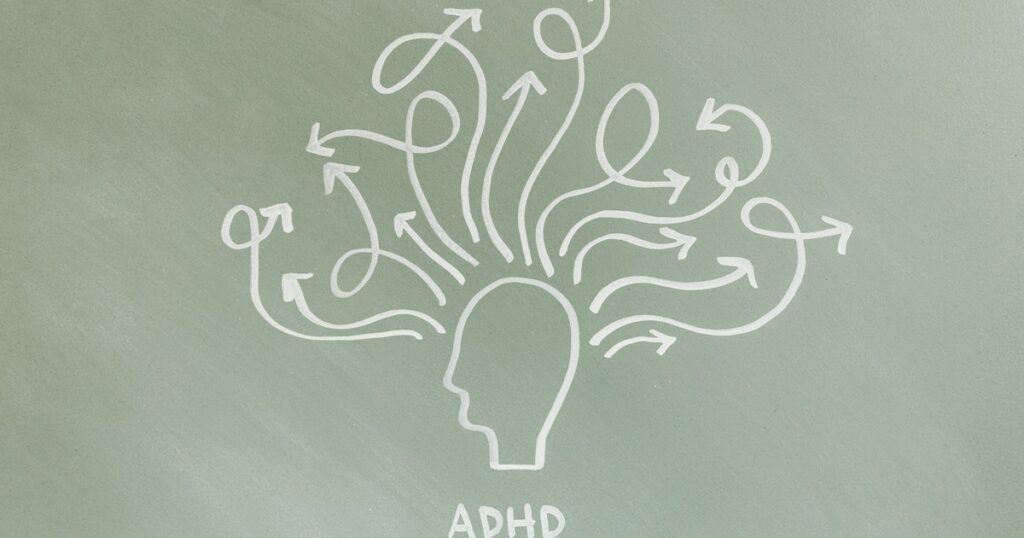Attention-deficit/hyperactivity disorder (ADHD) is a neurodevelopmental disorder that affects both children and adults.
It is characterized by a persistent pattern of inattention, hyperactivity, and impulsivity that can significantly impact an individual’s daily functioning.
In this article, we aim to provide a comprehensive overview of ADHD, its symptoms, and the diagnostic process. By understanding the basics, we can better recognize and support individuals with ADHD.
ADHD Symptoms
Inattention
One of the hallmark features of ADHD is inattention.
Individuals with ADHD often struggle to focus on tasks, pay attention to details, and follow through with instructions or tasks.
This can lead to a range of difficulties at school, work, and daily life. For instance, a child with ADHD may have trouble organizing schoolwork, completing assignments, and paying attention during lessons.
Common symptoms of inattention in ADHD
- Frequent careless mistakes in schoolwork or other activities
- Difficulty sustaining attention in tasks or play activities
- Often not listening when spoken to directly
- Difficulty organizing tasks and activities
- Avoidance or reluctance to engage in tasks that require sustained mental effort
It’s important to note that to meet the diagnostic criteria for ADHD, these symptoms should be present for at least six months and significantly impair the individual’s functioning.
Hyperactivity and Impulsivity
In addition to inattention, ADHD is characterized by symptoms of hyperactivity and impulsivity.
Hyperactivity refers to excessive and inappropriate levels of activity, while impulsivity involves making hasty decisions without considering the consequences.
Common symptoms of hyperactivity and impulsivity in ADHD
- Fidgeting or tapping hands or feet
- Inability to remain seated in situations where it’s expected
- Running or climbing in inappropriate situations
- Difficulty playing or engaging in activities quietly
- Talking excessively
- Interrupting or intruding on others’ conversations or games
These symptoms may manifest differently in children and adults with ADHD, but they share the common thread of impulsivity and excessive physical activity.
Combined Presentation in ADHD
ADHD is typically classified into three presentations based on the predominant symptoms:
- Primarily inattentive presentation;
- Primarily hyperactive-impulsive presentation, and;
- Combined presentation
The combined presentation is characterized by significant symptoms of both inattention and hyperactivity-impulsivity.
Understanding the specific presentation is crucial for tailoring interventions and treatments to an individual’s unique needs.
ADHD Diagnosis
Diagnosing ADHD is a complex process that involves careful evaluation by trained healthcare professionals.
The diagnosis should be based on a comprehensive assessment that includes
clinical observations, interviews with the individual and their family, and standardized rating scales.
Here are the key steps in the ADHD diagnostic process:
Clinical Evaluation
A psychiatrist or other qualified healthcare provider will conduct a clinical evaluation to assess the individual’s symptoms and their impact on daily life.
This evaluation often involves interviewing the individual and their family members to gather information about the individual’s behavior, developmental history, and medical history.
Rating Scales
Rating scales, such as the ADHD Rating Scale-5 (ADHD-RS-5) and Conners’ Rating Scales, are frequently used tools to assess ADHD symptoms.
These scales involve a series of questions about the individual’s behavior, and responses are scored to help determine the presence and severity of ADHD symptoms.
Rule Out Other Conditions
It’s essential to rule out other medical or psychological conditions that may mimic ADHD symptoms.
Conditions such as anxiety disorders, depression, and learning disabilities can sometimes co-occur with ADHD or present with similar symptoms.
ADHD Diagnostic Criteria
To meet the diagnostic criteria for ADHD, an individual must exhibit a sufficient number of symptoms of inattention, hyperactivity, and impulsivity, as outlined in the DSM-5.
These symptoms should persist for at least six months and cause significant impairment in social, academic, or occupational functioning.
The DSM-5 also specifies that the symptoms should be present before the age of 12 and should be present in two or more settings (e.g., home, school, work).
Developmental History
Gathering information about the individual’s developmental history is crucial for diagnosing ADHD.
Understanding when symptoms first appeared and how they have evolved over time can provide valuable insights.
Collateral Information
It’s often beneficial to obtain information from multiple sources, such as teachers, family members, and other caregivers, to gain a comprehensive view of the individual’s behavior and symptoms across different settings.
Functional Impairment
ADHD diagnosis requires evidence of significant functional impairment.
The symptoms should interfere with the individual’s ability to perform daily tasks, maintain relationships, and achieve their potential.
Duration of Symptoms
ADHD is a chronic condition, and the symptoms should be persistent for at least six months to qualify for diagnosis.
However, it’s worth noting that symptoms can change and evolve over time.
Final thoughts on the ADHD Symptoms and Diagnosis
ADHD is a neurodevelopmental disorder characterized by symptoms of inattention, hyperactivity, and impulsivity. It affects individuals of all ages and can significantly impact various aspects of their lives.
Early recognition and diagnosis of ADHD is essential for implementing effective interventions and support.
Understanding the basics of ADHD, including its symptoms and the diagnostic process, is crucial for healthcare professionals, educators, and families. It allows for early intervention and helps individuals with ADHD lead fulfilling and successful lives. If you suspect that you or someone you know may have ADHD, it’s essential to seek the guidance of a qualified healthcare professional who can conduct a thorough assessment and provide appropriate recommendations and treatments.
At Arete Health, we have a fully trained team that can work with you or your child to help diagnose and manage the symptoms of ADHD. We will teach you strategies to cope with your diagnosis and help you to lead a more fulfilling life. Reach out to us on admin@aretehealth.co.uk or make an appointment here.


